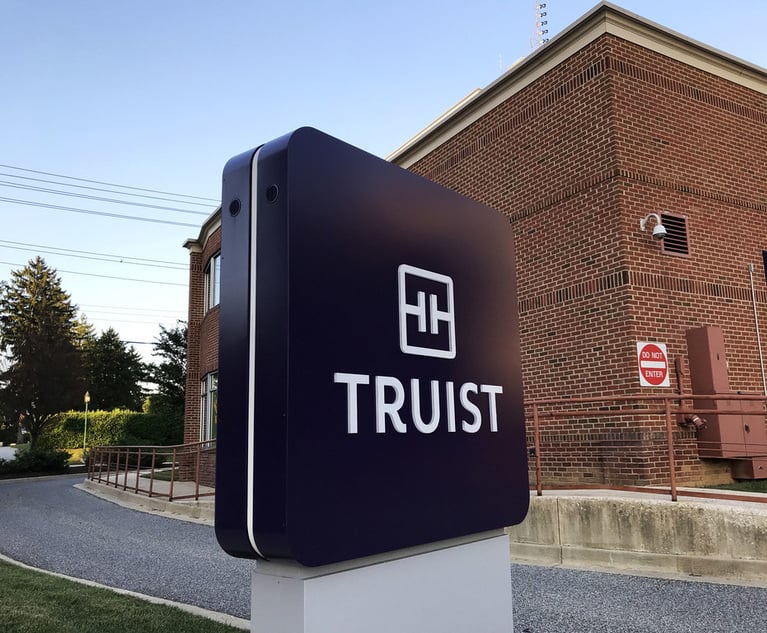Your Guide to the Top Nine New Local Bankruptcy Rules
Just in time for the holiday season, the U.S. District Court of the Eastern District of Pennsylvania (at the request of the Board of Bankruptcy Judges) promulgated new Local Bankruptcy Rules which will go into effect Dec. 1.
November 30, 2017 at 11:50 AM
5 minute read

Just in time for the holiday season, the U.S. District Court of the Eastern District of Pennsylvania (at the request of the Board of Bankruptcy Judges) promulgated new Local Bankruptcy Rules which will go into effect Dec. 1. The rules were a culmination of an extensive study and drafting process to update the existing Local Rules to conform them to local practice and otherwise implement certain items necessary to be consistent with the National Rules which are also going into effect on Dec. 1.
The total number of Local Rules has increased substantially; however, it was not the intention to make the practice more difficult. Rather, in many instances, several existing rules were lengthy and contained numerous different ideas. They are now separated into distinct rules for ease of reference and compliance. Further, in light of the substantial amendments to the provisions of the national bankruptcy rules governing appeals in bankruptcy matters, substantial local rule amendments were required in order to conform local practice to the new national rule model.
While practitioners should review all of the Local Rules to familiarize themselves with the practice in front of the Bankruptcy Court, the goal of this article is to highlight those specific changes which will have direct impact on day to day practice. The highlighted rules are as follows:
- Rule 1002-2 creates greater complex case eligibility which will allow additional cases to be treated as “complex cases” in the Eastern District of Pennsylvania.
- Rule 2004-1 creates a more flexible and streamlined procedure for 2004 examinations and allows for the issuance of a subpoena (upon consent of the receiving party) without the need for first having to secure an order.
- Rule 2014-1 provides for increased disclosures to evaluate conflicts and eligibility for appointment for professionals representing trustees, committees and debtors-in-possession.
- Rule 2016-3 provides for an increase in the “no look” fees awarded to Chapter 13 professionals in “above median” and “below median” cases. The rule also allows for automatic adjustments to these fees every four years in the same manner that the dollar amounts in other sections of the Bankruptcy Code are adjusted by the Judicial Conference of the United States.
- Rule 3007-1 addresses the procedures related to the claim objections to prevent “trial by surprise”. It requires a claimant to advise the objector prior to the hearing date of the intention to proceed at the originally scheduled hearing on an evidentiary basis. In the absence of providing confirmation, the objector is entitled to an automatic continuance to allow for the evidentiary preparations.
- Rule 3015-1 mandates use of a district-wide local form Chapter 13 plan. The form is titled Local Bankruptcy Form 3015.1-1. Over the years, there have been numerous attempts to produce a model Chapter 13 Plan for use in the Eastern District of Pennsylvania without success. However, new motivation to promulgate a local plan was provided with the adoption of a national rule requiring use of a national form Chapter 13 plan or a single, local form plan adopted by the bankruptcy district. The Eastern District Form plan resembles the national plan, but also maintains local practice in many areas. The plan sets forth plan funding at the outset to allow trustees and creditors to determine feasibility at a glance and provides separate sections for treatment of the various types of creditor claims. After some growing pains, the plan should prove to be easy to use by debtors' counsel and should facilitate review of the plan by creditors, the Chapter 13 trustee and the court.
- Part V was revised to incorporate in one place in the local rules all of the various standing orders related to electronic filing. Also, the new rules clarify the procedure for submitting documents under seal.
- Part 8 of the Local Rules attempts to streamline the appellate process for practitioners. Since the Part 8 of the National Rules is modeled, in large part, on the Federal Rules of Appellate Procedure, the existing Local Rules are modeled, in large part, on the Local Rules of the Third Circuit.
- Rule 9019 revises the mediation rules to provide greater flexibility for professionals to identify a potential mediator, have the mediator appointed and compensated and proceed to mediation efficiently and effectively.
There are also certain changes to local forms. Other than the substantive implementation of the Form Chapter 13 Plan, the changes to the local forms are largely stylistic. Nevertheless, it requires practitioners update their “form bank” to all “new” forms in effect started Dec. 1.
Derek Baker is a partner at Reed Smith, in the firm's fnancial industry group. He is a resident in the Philadelphia and Princeton offices, practicing in the area of commercial restructuring and bankruptcy.
Patricia M. Mayer is a partner at Waterman & Mayer. She focuses her practice on representing individuals and small business owners in consumer bankruptcy cases, IRS collection matters and mortgage foreclosure defense.
This content has been archived. It is available through our partners, LexisNexis® and Bloomberg Law.
To view this content, please continue to their sites.
Not a Lexis Subscriber?
Subscribe Now
Not a Bloomberg Law Subscriber?
Subscribe Now
NOT FOR REPRINT
© 2025 ALM Global, LLC, All Rights Reserved. Request academic re-use from www.copyright.com. All other uses, submit a request to [email protected]. For more information visit Asset & Logo Licensing.
You Might Like
View All
Federal Judge Allows Elderly Woman's Consumer Protection Suit to Proceed Against Citizens Bank
5 minute read
Dilworth Paxson Launches Erie Office With Longtime Local Banking Attorney
4 minute read
Stradley Ronon Bolsters Investment Management Practice With Vanguard Hire
4 minute readTrending Stories
- 1Understanding the HEMS Standard in Trusts
- 2Mergers Are About People, Not Paperwork: Here’s Why
- 3Wachtell Partner Leaves to Chair Latham's Liability Management Practice
- 4Morris Nichols Partners to Be Involved With PLI Program
- 5How I Made Practice Group Chair: 'Cultivating a Culture of Mutual Trust Is Essential,' Says Gina Piazza of Tarter Krinsky & Drogin
Who Got The Work
J. Brugh Lower of Gibbons has entered an appearance for industrial equipment supplier Devco Corporation in a pending trademark infringement lawsuit. The suit, accusing the defendant of selling knock-off Graco products, was filed Dec. 18 in New Jersey District Court by Rivkin Radler on behalf of Graco Inc. and Graco Minnesota. The case, assigned to U.S. District Judge Zahid N. Quraishi, is 3:24-cv-11294, Graco Inc. et al v. Devco Corporation.
Who Got The Work
Rebecca Maller-Stein and Kent A. Yalowitz of Arnold & Porter Kaye Scholer have entered their appearances for Hanaco Venture Capital and its executives, Lior Prosor and David Frankel, in a pending securities lawsuit. The action, filed on Dec. 24 in New York Southern District Court by Zell, Aron & Co. on behalf of Goldeneye Advisors, accuses the defendants of negligently and fraudulently managing the plaintiff's $1 million investment. The case, assigned to U.S. District Judge Vernon S. Broderick, is 1:24-cv-09918, Goldeneye Advisors, LLC v. Hanaco Venture Capital, Ltd. et al.
Who Got The Work
Attorneys from A&O Shearman has stepped in as defense counsel for Toronto-Dominion Bank and other defendants in a pending securities class action. The suit, filed Dec. 11 in New York Southern District Court by Bleichmar Fonti & Auld, accuses the defendants of concealing the bank's 'pervasive' deficiencies in regards to its compliance with the Bank Secrecy Act and the quality of its anti-money laundering controls. The case, assigned to U.S. District Judge Arun Subramanian, is 1:24-cv-09445, Gonzalez v. The Toronto-Dominion Bank et al.
Who Got The Work
Crown Castle International, a Pennsylvania company providing shared communications infrastructure, has turned to Luke D. Wolf of Gordon Rees Scully Mansukhani to fend off a pending breach-of-contract lawsuit. The court action, filed Nov. 25 in Michigan Eastern District Court by Hooper Hathaway PC on behalf of The Town Residences LLC, accuses Crown Castle of failing to transfer approximately $30,000 in utility payments from T-Mobile in breach of a roof-top lease and assignment agreement. The case, assigned to U.S. District Judge Susan K. Declercq, is 2:24-cv-13131, The Town Residences LLC v. T-Mobile US, Inc. et al.
Who Got The Work
Wilfred P. Coronato and Daniel M. Schwartz of McCarter & English have stepped in as defense counsel to Electrolux Home Products Inc. in a pending product liability lawsuit. The court action, filed Nov. 26 in New York Eastern District Court by Poulos Lopiccolo PC and Nagel Rice LLP on behalf of David Stern, alleges that the defendant's refrigerators’ drawers and shelving repeatedly break and fall apart within months after purchase. The case, assigned to U.S. District Judge Joan M. Azrack, is 2:24-cv-08204, Stern v. Electrolux Home Products, Inc.
Featured Firms
Law Offices of Gary Martin Hays & Associates, P.C.
(470) 294-1674
Law Offices of Mark E. Salomone
(857) 444-6468
Smith & Hassler
(713) 739-1250






